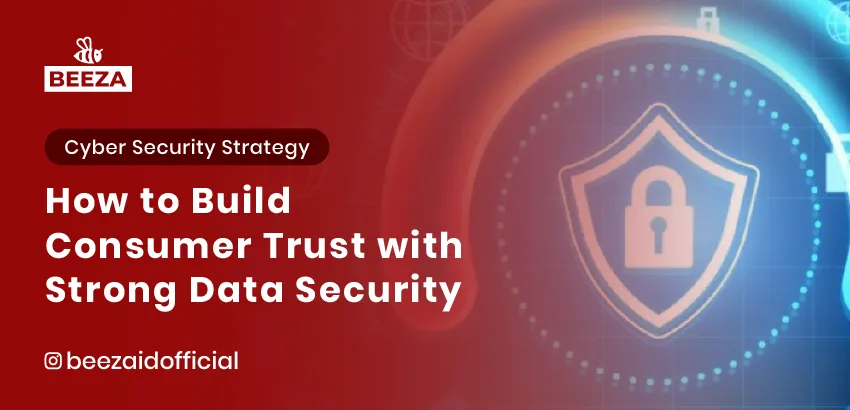
Introduction : How to Build Consumer Trust with Strong Data Security
In today’s digital world, consumer trust goes beyond just product quality—it also depends on how well a business protects customer data. With increasing cases of data breaches, consumers are now more aware of the importance of data security when interacting with businesses.
A study found that 87% of consumers will not do business with a company that has weak data security. This highlights the growing demand for businesses to prioritize data protection as part of their trust-building strategy.
This article explores the key strategies to build consumer trust through strong data security and how businesses can effectively implement them.
1. Why Data Security is Crucial for Consumer Trust?
Customer trust is built on transparency, reliability, and security. When consumers feel their personal information is protected, they are more likely to engage and remain loyal to a brand.
Some key benefits of strong data security for consumer trust:
✅ Enhances Customer Loyalty – Customers are more likely to continue using services when they feel safe.
✅ Prevents Financial Losses – Cyberattacks can lead to lawsuits, fines, and reputational damage.
✅ Improves Brand Reputation – Companies known for strong data security are more trusted by customers and business partners.
2. Effective Strategies to Build Consumer Trust with Strong Data Security
🔐 a. Be Transparent About Data Collection and Usage
Consumers want to know how their data is collected and used. Being transparent about data policies helps build trust and reassures customers that their privacy is valued.
✅ Provide a clear and accessible privacy policy on your website and app.
✅ Use simple language to explain how customer data is stored and used.
✅ Allow customers to manage their privacy settings and opt-out options.
📌 Example: Tech giants like Apple and Google provide privacy dashboards that let users control how their data is collected and used.
🛡️ b. Implement Multi-Layered Security Measures
A strong security strategy requires multiple layers of protection to safeguard customer data from cyber threats.
✅ Encrypt sensitive customer data to prevent unauthorized access.
✅ Enable two-factor authentication (2FA) for enhanced login security.
✅ Use firewalls and threat detection systems to prevent cyberattacks.
📌 Example: Financial institutions and payment platforms use multi-factor authentication (MFA) to prevent unauthorized account access.
👨🏫 c. Educate Customers on Data Security Best Practices
Building trust isn’t just about protecting data—it’s also about empowering customers to safeguard their own information.
✅ Share cybersecurity tips via emails, blogs, and social media.
✅ Educate customers on phishing scams and data breaches.
✅ Provide guidance on creating strong passwords and securing their accounts.
📌 Example: Many banks send security awareness emails to help customers recognize and avoid phishing attacks.
📜 d. Comply with Industry Security Standards and Regulations
Following established data security regulations like GDPR, ISO 27001, or local cybersecurity laws demonstrates a company’s commitment to data protection.
✅ Ensure your business complies with relevant data security laws.
✅ Obtain security certifications to boost customer confidence.
✅ Conduct regular security audits to identify and fix vulnerabilities.
📌 Example: Companies like Microsoft and Amazon comply with ISO 27001 certification, showing their strong commitment to data security.
🔄 e. Respond to Security Breaches Quickly and Transparently
Even with the best security measures, no system is completely immune to data breaches. If an incident occurs, handling it with transparency and urgency is key to maintaining customer trust.
✅ Notify affected customers immediately and explain the situation.
✅ Provide solutions, such as changing passwords or enhancing security measures.
✅ Strengthen security systems to prevent future breaches.
📌 Example: When LinkedIn experienced a data breach, they promptly informed users, enforced password resets, and improved security protocols to restore trust.
3. Case Studies: Companies Successfully Building Trust with Data Security
📌 Apple: Prioritizing User Privacy
Apple is known for its strict privacy policies, including App Tracking Transparency (ATT), which allows users to control how their data is used. This move increased consumer trust in Apple’s brand.
📌 Tokopedia: Strengthening Security After Data Breaches
After experiencing a data breach, Tokopedia enhanced its encryption, introduced stronger authentication methods, and educated users on security best practices, successfully regaining customer confidence.
Conclusion
Strong data security is no longer just a legal requirement—it’s a vital business strategy for building consumer trust. By implementing transparency, multi-layered security, regulatory compliance, and rapid response to security incidents, businesses can foster long-term customer loyalty.
🔹 Want to enhance your business’s data security? Contact Beeza today for expert solutions in data protection!